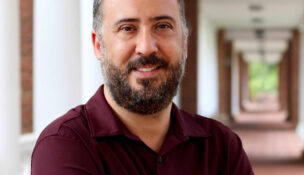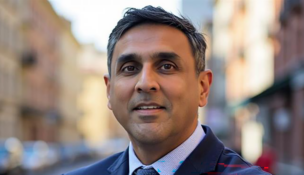Richmond-based attorneys win U.S. Supreme Court case
Dominion, Troutman lawyers represented veteran in GI Bill lawsuit
Kate Andrews //April 16, 2024//

From left: Dominion Energy Senior Counsel David DePippo, FBI Special Agent and plaintiff James Rudisill, and Troutman Pepper Partner Tim McHugh at the U.S. Supreme Court in November 2023. Photo courtesy Troutman Pepper, photographed by Charles King

From left: Dominion Energy Senior Counsel David DePippo, FBI Special Agent and plaintiff James Rudisill, and Troutman Pepper Partner Tim McHugh at the U.S. Supreme Court in November 2023. Photo courtesy Troutman Pepper, photographed by Charles King
Richmond-based attorneys win U.S. Supreme Court case
Dominion, Troutman lawyers represented veteran in GI Bill lawsuit
Kate Andrews //April 16, 2024//
After nine years and through three U.S. presidents, two Richmond-based attorneys and their client, an FBI agent who also lives in Richmond, received great news Tuesday: They had won their U.S. Supreme Court case against the federal government.
Rudisill v. McDonough was decided 7-2 in favor of plaintiff Jim Rudisill, a retired Army captain who sought to use education funds he earned through two periods of military service. In 2015, he appealed the U.S. Department of Veterans Affairs‘ decision to deny him about a year’s worth of GI Bill funding, with the help of two Richmond attorneys then employed at Hunton Andrews Kurth.
David DePippo and Tim McHugh took on Jim Rudisill’s case pro bono in 2015. According to DePippo, they figured it would be a relatively simple matter. The attorneys certainly didn’t think it would end up at the highest court in the land.
Rudisill served two stints in the U.S. Army — as an enlisted member from 2000 to 2002 and then as a commissioned officer from 2007 to 2011 — and sought to use two GI Bills to pay for his expenses at Yale Divinity School, but the VA said he could not use all 48 months of college benefits Rudisill believed he had earned.
An FBI agent based in Richmond, Rudisill had used part of the Montgomery G.I. Bill for his undergraduate education, but had not used the Post-9/11 fund. He hoped to use the two funds to cover his tuition at Yale and then return to the Army to serve as a chaplain, but the VA denied him approximately 10 months of benefits. That’s when DePippo and McHugh got involved.
In 2015, McHugh was a newly minted first-year associate — having paid for law school through his own GI Bill benefits — and was donating time to Hunton’s pro bono office when he was tapped to work on the Rudisill case with DePippo, who was co-chair of the firm’s veterans pro bono program and a veteran himself.
They began by simply representing Rudisill at a VA administrative appeal, DePippo said in an interview Tuesday with Virginia Business.
They expected the matter might go to the U.S. Court of Appeals for Veterans Claims, and that’s what happened. Rudisill won the case, but the VA was not taking this lying down. There were more appeals, all the way up to the U.S. Supreme Court, continuing through three presidential terms.
Meanwhile, life went on for the plaintiff and his lead attorneys, who were assisted by at least 30 to 40 lawyers and paralegals over the nine-year process, and spent an average of 100 hours a year each on the case.
DePippo left Hunton about seven years ago and joined Dominion Energy, which was aware of and supportive of his work on the pro bono case, as the utility’s legal department also participates in extensive pro bono legal work, he said.
McHugh moved to Troutman Pepper‘s Richmond office about two and a half years ago as an associate and has become partner. Like DePippo, he brought up the VA case during interviews with the firm and said it was important to him to continue working on it. Troutman, which does not place a cap on its attorneys’ pro bono hours, was on board, he said.
Rudisill, who served three tours of duty in Iraq and Afghanistan and was wounded in Iraq in 2005, stayed with the FBI — in 2015, he was instrumental in stopping two men from attacking churches and synagogues in the Richmond area, according to a Richmond Times-Dispatch news story.
In November 2023, the two sides presented their arguments to the U.S. Supreme Court, with Misha Tseytlin, a Chicago-based attorney for Troutman making Rudisill’s case, and Vivek Suri of the Justice Department representing the government. Although DePippo had written amicus briefs before, this was his first time as a lead attorney on a Supreme Court case, and this was also McHugh’s first case before the high court. Both said it’s a lot of work to prepare for the justices’ questions, but they were impressed by the justices and the court staffers.
“It’s humbling, and it’s impressive,” DePippo said. “What you don’t see, because the Supreme Court is not on television, is just how incredibly smart and detailed and diligent the justices are and certainly their clerks and their staff, and how seriously all the parties that are involved take it.”
On Tuesday, the Supreme Court released its 39-page decision, with Associate Justice Ketanji Brown Jackson authoring the majority opinion and associate justices Samuel Alito and Clarence Thomas dissenting. They ruled that service members who accrue benefits under both the Post-9/11 Veterans Act and the Montgomery GI Bill through separate periods of service can use either pool of money to pay for up to 48 months for their educations.
“The bottom line is this: Veterans who separately accrue benefits under both the Montgomery and Post-9/11 GI Bills are entitled to both benefits,” Jackson wrote, overturning a federal circuit court ruling in the government’s favor. Justice Thomas wrote in his dissenting opinion that the federal statute limiting the use of multiple GI Bills, “though complicated, is ultimately unambiguous.”
Rudisill was not available for an interview Tuesday afternoon because he was at a secure facility all day for work, DePippo said, but the attorneys reached him by phone briefly to tell him the news.
“He was just elated,” McHugh said. “I’m sure he wouldn’t mind me saying that. Just true to form, his happiness and elation was really about everybody else [who would benefit from the decision]. He wants everyone else to get these benefits. This whole case started off with him wanting to go … to Yale Divinity School, wanted to become an [Army] chaplain to minister to service members and help folks with PTSD and stuff like that.”
As of now, it’s not clear how many veterans will benefit from the Supreme Court’s decision, but it’s possible up to 1.7 million post-9/11 vets could benefit, DePippo said, and he and McHugh are working together now on other GI Bill suits involving veterans with different situations than Rudisill’s, as well as those who wish to pass along their benefits to family members.
Rudisill, 43, is now over the age limit to rejoin the Army as a chaplain, but DePippo said he’s enrolled in a seminary (although not Yale) and will be able to use the federal benefits he won Tuesday to cover his education costs. And since all three men are in Richmond, DePippo hopes they’ll get together soon for a celebratory meal.
“He is now in the naval reserves and hopes to be ordained as a chaplain in the naval reserves,” DePippo said. “He still hopes to achieve that goal, and I think he’s gonna get there. You can always use more people like Jim.”


















